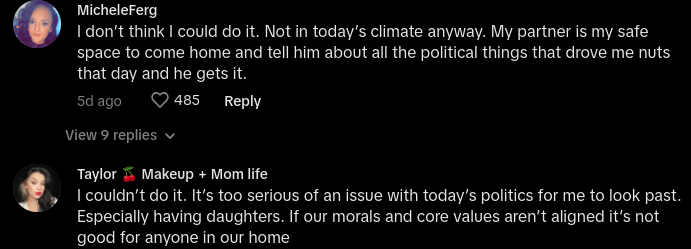TikToker Shares Struggles With Political Differences in Her Marriage
One commenter wrote, "Had that issue and now we're divorced."
Published July 22 2024, 11:25 a.m. ET

TikToker Samantha (@samantha_131337) recently posted a video addressing a common yet contentious issue in American households: political differences. The video, titled "political issues," has garnered 291K views. In it, Samantha speaks candidly about the political divide between her and her husband.
Lying in bed, Samantha shared, “We got some big problems up in my household. ... So in my household, me and my husband. One of us is Republican and one of us is Democrat. And it's not just like we just support those parties. Like, we are like hardcore Democrat. Hardcore Republican. ... I swear, if we get divorced, it's going be because of political [differences]. We try not to talk about it, but it's hard.”
Considering the current political climate, many TikTok users had a lot to say about Samantha's predicament. One user commented, "I will never understand why people think political differences 'aren't that big of a deal' in a marriage. Like, those are your values. You gotta be on the same page with your values."
Another user shared a personal story, "I lost my entire family over the last eight years. It's so frustrating when people say, 'Don't let it get between you,' but it's like ... these are structural differences in morals and beliefs."
A third commenter related to Samantha’s struggle: "Very same conversations in mine. Married 22 years and this is the most divided politically we have ever been and it is rough." Samantha responded in the comments, "Times are rough. It has never been so divided."
The combined effects of change and continuity have left the country's two major parties at virtual parity: About half of registered voters (49 percent) identify as Democrats or lean toward the Democratic Party, while 48 percent identify as Republicans or lean Republican.

This division is reflected in electoral outcomes, such as the 2020 presidential election, where Joe Biden received 306 electoral votes and Donald Trump received 232. Despite Biden's victory, the national popular vote was also closely contested, with Biden receiving 81.2 million votes and Trump receiving 74.2 million votes.
The political landscape continues to shift. Joe Biden officially resigned from the presidential race in a written statement posted online where he endorsed Kamala Harris publicly. Some believe Trump will fare better against Harris should she receive the Democratic nomination.

Both major political parties have shifted more toward their respective ideological extremes over the years. For example, the percentage of Republicans with consistently conservative values increased from 31 percent in 2004 to 53 percent in 2015, while Democrats with consistently liberal values rose from 30 percent in 1994 to 60 percent in 2015. This ideological shift has created a wider gap between the two parties than in previous decades.
Samantha’s video and the reactions it elicited highlight the significant impact that political differences can have on personal relationships. The deepening divide in American politics is not just a matter of differing opinions but reflects fundamental differences in values and beliefs.
Studies on tolerance between liberals and conservatives seem to indicate that those who adopt the latter's ideologies and philosophies are ultimately more welcoming of others.

The National Post writes, "Liberals [are] more intolerant of people who don't think like them than conservatives."
The Boston Herald also wrote, "Liberals are also 'far more likely than conservatives are to say they are no longer friends with someone due to political differences.'"
One Quora forum poster also questioned why conservatives, despite being more accepting of working with and being friends with self-proclaimed liberals, are generally viewed as being more intolerant people: "Even though individual exceptions exist, conservatives are generally more tolerant toward liberals than liberals are toward conservatives. So how come conservatives are viewed as the intolerant ones?"
Politico also posted an article simply titled: "Why liberals aren't as tolerant as they think." It reads, "The political left might consider itself more open-minded than the right. But research shows that liberals are just as prejudiced against conservatives as conservatives are against liberals."

As Samantha and many others have experienced, navigating these differences within a household can be incredibly challenging and the temperature has only been turned up.
Well, Samantha, it's hard out there, but we're rooting for the two of you!